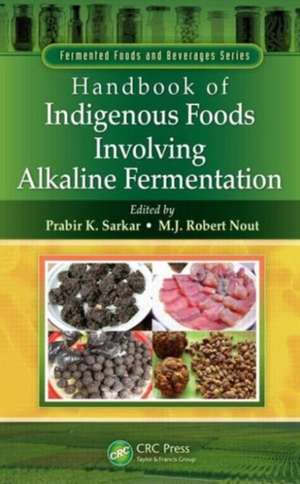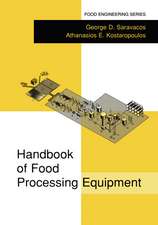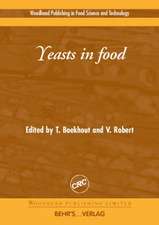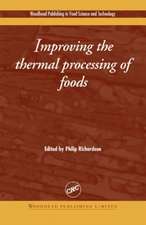Handbook of Indigenous Foods Involving Alkaline Fermentation: Fermented Foods and Beverages Series
Editat de Prabir K. Sarkar, M.J. Robert Nouten Limba Engleză Hardback – 23 iul 2014
Presented in nine chapters, the book explains how microorganisms or enzymes transform raw ingredients into AFFs. It discusses the safety aspects of AFFs, and considers the challenges associated with the technological aspects in modernizing AFFs. It stresses the significance of the microbiological and biochemical processes in the fermentations, as well as the factors that influence the development of the characteristic microbiota, and the biochemical and organoleptic changes induced by them. It also proposes solutions, discusses the value of AFFs and related dominant microorganisms, and assesses the future of AFFs.
The authors highlight commonly known foods and beverages of plant and animal origin. They provide insight into the manufacture, chemical and microbiological composition, processing, and compositional and functional modifications taking place as a result of microbial and enzyme effects. The text examines safety, legislation, traditional and industrialized processes, as well as new product development, and opportunities for developing commodities from Africa, Asia, Europe, Latin America, and the Middle East. In addition, it also assesses the value of food processing by-products, biotechnology, and engineering of solid-state processes, modern chemical and biological analytical approaches to safety, and health and consumer perception.
- Focuses on how fermentation of food remains an important aspect of food processing
- Describes how fermentation of food contributes to its preservation
- Details how fermented food gets its flavor from microbial and enzymatic modifications of food components such as sugars, fats, and proteins
Preț: 1345.16 lei
Preț vechi: 1640.44 lei
-18% Nou
Puncte Express: 2018
Preț estimativ în valută:
257.39€ • 269.46$ • 212.98£
257.39€ • 269.46$ • 212.98£
Carte tipărită la comandă
Livrare economică 05-19 aprilie
Preluare comenzi: 021 569.72.76
Specificații
ISBN-13: 9781466565296
ISBN-10: 1466565292
Pagini: 629
Ilustrații: 105
Dimensiuni: 156 x 234 x 38 mm
Greutate: 0.98 kg
Ediția:1
Editura: CRC Press
Colecția CRC Press
Seria Fermented Foods and Beverages Series
ISBN-10: 1466565292
Pagini: 629
Ilustrații: 105
Dimensiuni: 156 x 234 x 38 mm
Greutate: 0.98 kg
Ediția:1
Editura: CRC Press
Colecția CRC Press
Seria Fermented Foods and Beverages Series
Cuprins
Introduction. Diversity of Plant-Based Food Products Involving Alkaline Fermentation. Diversity of Animal-Based Food Products Involving Alkaline Fermentation. Microorganisms Predominating in Alkaline-Fermented Foods. Quality Aspects of Alkaline-Fermented Foods, Safety Aspects of Alkaline-Fermented Foods. Challenges Associated withTechnological Aspects for Modernization of Alkaline-Fermented Foods. Value-Added Products fromAlkaline-Fermented Foods or from Microorganisms Predominating Therein. Future of Alkaline-Fermented Foods forTraditional Markets, Outlook (Research Needs).
Recenzii
"The book is directed at an academic and professional audience—graduate students, researchers in food science and technology, and those working in nutrition, dietetics, food microbiology, and related disciplines. Highly recommended for academic libraries."
—ARBA
—ARBA
Descriere
Handbook of Indigenous Foods Involving Alkaline Fermentation details the basic approaches of alkaline fermentation, provides a brief history, and offers an overview of the subject. Devoted exclusively to alkaline-fermented foods (AFFs), this text includes contributions from experts from around the globe. It discusses the diversity of indigenous fermented foods involving an alkaline reaction, as well as the taxonomy, ecology, physiology, and genetics of predominant microorganisms occurring in AFFs.
Presented in nine chapters, the book explains how microorganisms or enzymes transform raw ingredients into AFFs. It discusses the safety aspects of AFFs, and considers the challenges associated with the technological aspects in modernizing AFFs. It stresses the significance of the microbiological and biochemical processes in the fermentations, as well as the factors that influence the development of the characteristic microbiota, and the biochemical and organoleptic changes induced by them. It also proposes solutions, discusses the value of AFFs and related dominant microorganisms, and assesses the future of AFFs.
The authors highlight commonly known foods and beverages of plant and animal origin. They provide insight into the manufacture, chemical and microbiological composition, processing, and compositional and functional modifications taking place as a result of microbial and enzyme effects. The text examines safety, legislation, traditional and industrialized processes, as well as new product development, and opportunities for developing commodities from Africa, Asia, Europe, Latin America, and the Middle East. In addition, it also assesses the value of food processing by-products, biotechnology, and engineering of solid-state processes, modern chemical and biological analytical approaches to safety, and health and consumer perception.














